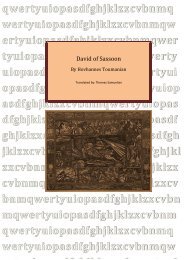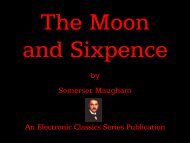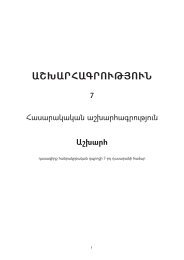Focus on Words
Focus on Words
Focus on Words
You also want an ePaper? Increase the reach of your titles
YUMPU automatically turns print PDFs into web optimized ePapers that Google loves.
2.Very often in order to be expressive or exciting the writer or speaker exaggerates<br />
some facts or c<strong>on</strong>cepts. The deliberate exaggerati<strong>on</strong> of the quantitative or qualitative<br />
aspect of the menti<strong>on</strong>ed object is expressed in the hyperbole, e.g.<br />
She has a nose that’s at least three inches too l<strong>on</strong>g.<br />
When we describe our admirati<strong>on</strong> or anger and say “I would gladly see this film a<br />
hun dred times”, we use language hyper boles, which have lost their originality and are<br />
<strong>on</strong>ly the signals of our roused emoti<strong>on</strong>s. Hyperbole is used also for a humorous effect.<br />
It creates vivid, lasting mental pictures in readers’ minds.<br />
Find cases of ir<strong>on</strong>y and hyperbole in the following sentences.<br />
1. She was all angles and b<strong>on</strong>es.<br />
2. The problem is as clear as mud.<br />
3. Oh, it’s the topic of the age.<br />
4. The girls were dressed to kill.<br />
Reading short stories<br />
Before you read<br />
1. Have you ever liked or disliked writers for their mastery of the language?<br />
2. Are you able to express what you like in the piece of literature you are reading?<br />
3. Find cases of ir<strong>on</strong>y and hyperbole in the text.<br />
The Kite<br />
Background<br />
William Somerset Maugham [mO:m], 25 January 1874 – 16<br />
December 1965) was an English playwright, novelist and short<br />
story writer. He was am<strong>on</strong>g the most popular writers of his era.<br />
His short stories always have a very interesting plot and show his<br />
great life experience, love for sharp mind. His stories are also<br />
popular because of his subtle humour.<br />
by Somerset Maugham<br />
C<strong>on</strong>text<br />
Herbert was an <strong>on</strong>ly child. They doted <strong>on</strong> him. Mrs. Sunbury<br />
brought him up carefully. She taught him to sit up at the table and<br />
not to put his elbow <strong>on</strong> it, and she taught him how to use his fork<br />
and knife like a little gentleman. She taught him to stretch out his<br />
little finger when he took his tea-cup to drink out of it and when he asked why, she said:<br />
“Never you mind. 1 ”<br />
In due course Herbert grew old enough to go to school. Mrs. Sunbury was anxious because<br />
she had never let him play with other children in the street. She didn’t like the idea of Herbert<br />
being thrown into c<strong>on</strong>tact with a lot of rough boys at school.<br />
Herbert got <strong>on</strong> very well at school. He was a good worker and far from stupid, and his<br />
reports were excellent...<br />
1. never you mind - ϳñ¨áñ ã¿` ÇÝãáõ<br />
136
















